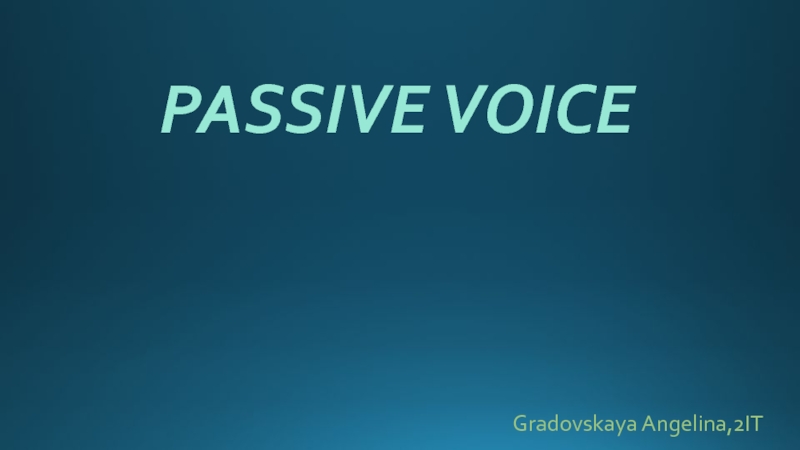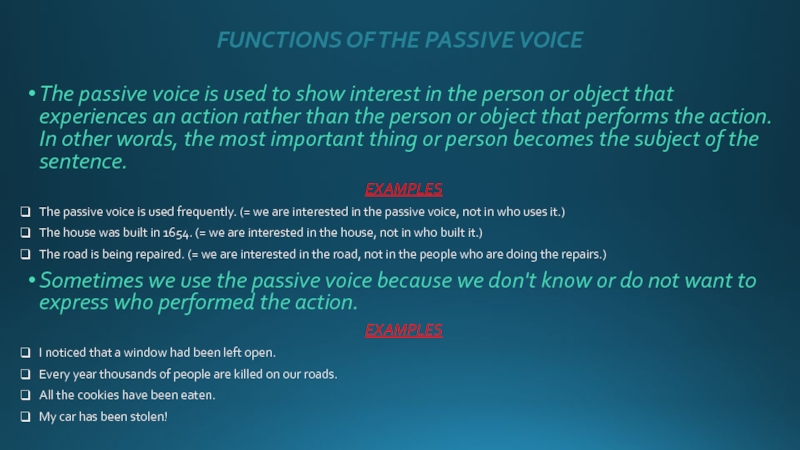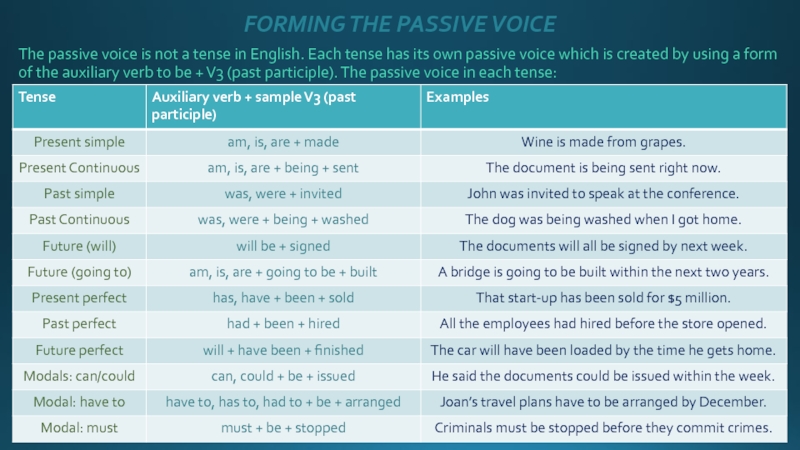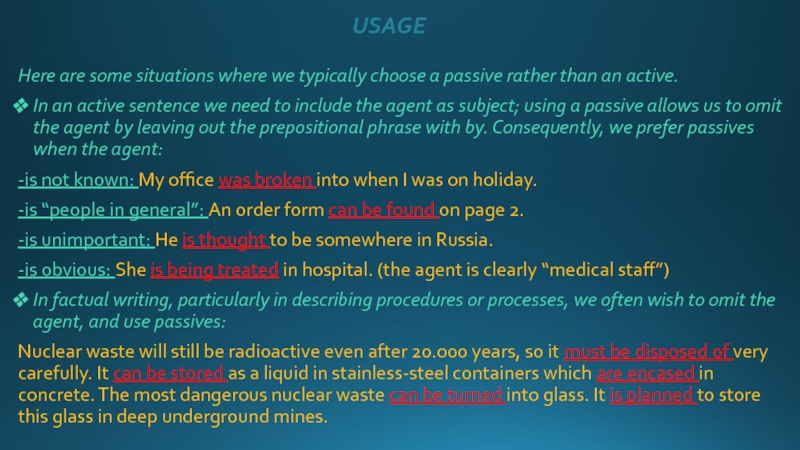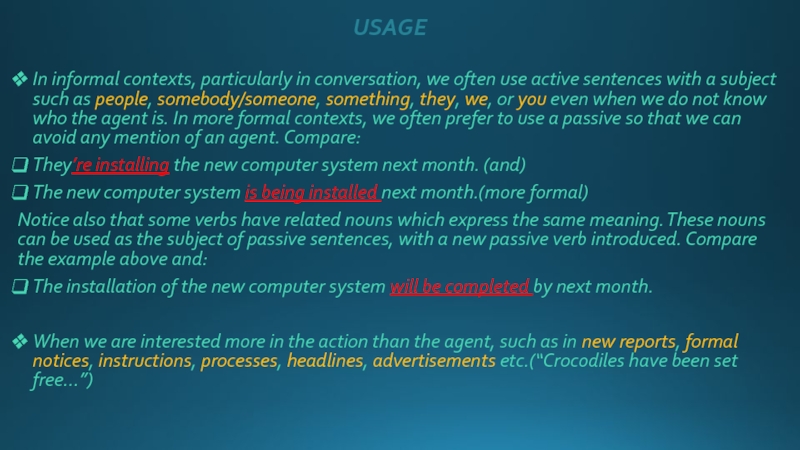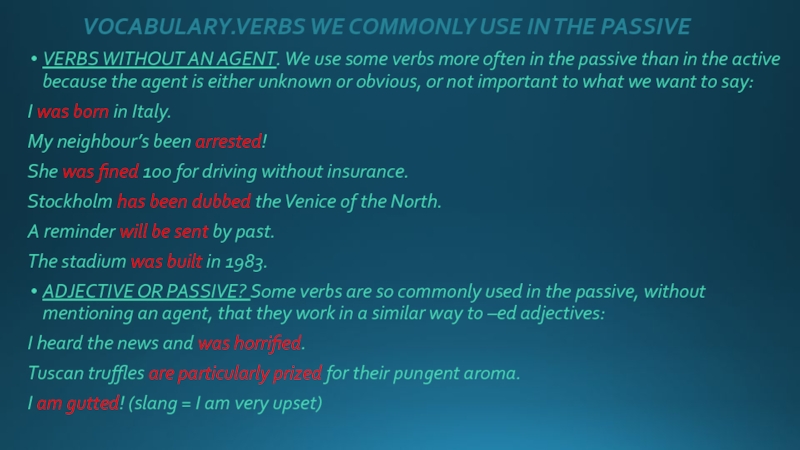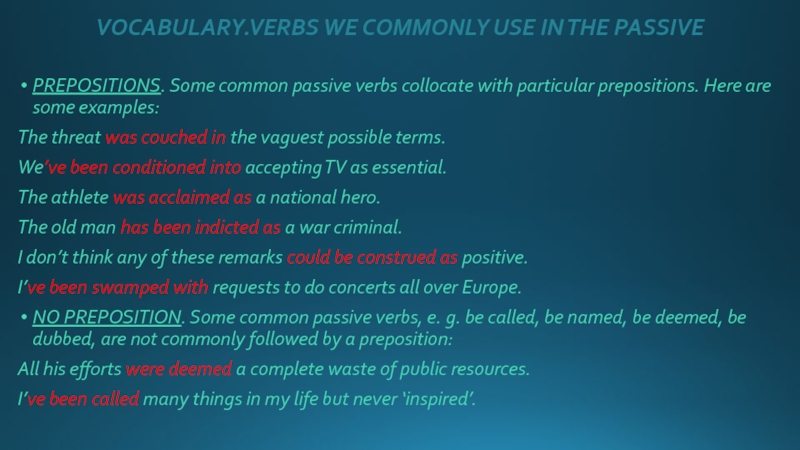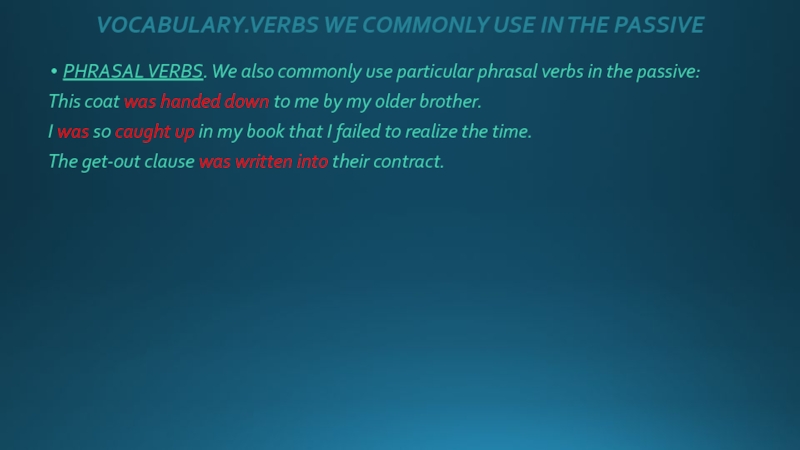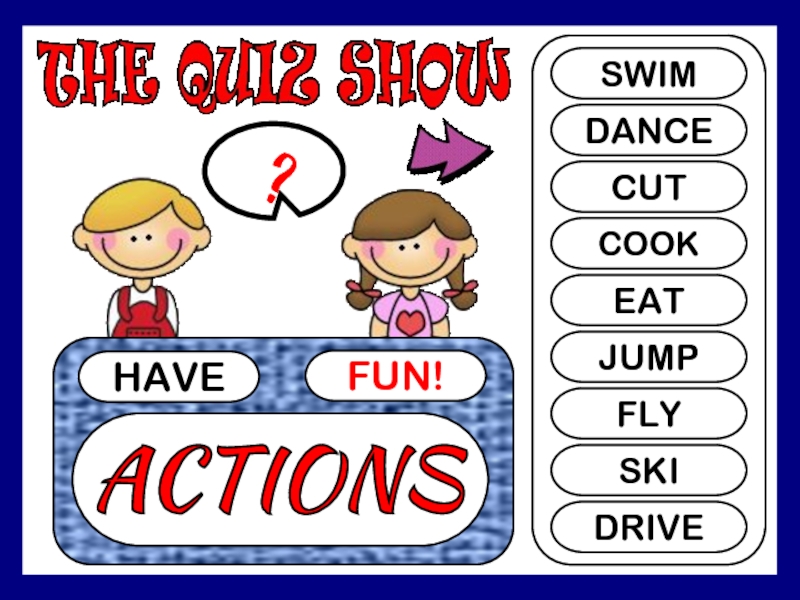- Главная
- Разное
- Дизайн
- Бизнес и предпринимательство
- Аналитика
- Образование
- Развлечения
- Красота и здоровье
- Финансы
- Государство
- Путешествия
- Спорт
- Недвижимость
- Армия
- Графика
- Культурология
- Еда и кулинария
- Лингвистика
- Английский язык
- Астрономия
- Алгебра
- Биология
- География
- Детские презентации
- Информатика
- История
- Литература
- Маркетинг
- Математика
- Медицина
- Менеджмент
- Музыка
- МХК
- Немецкий язык
- ОБЖ
- Обществознание
- Окружающий мир
- Педагогика
- Русский язык
- Технология
- Физика
- Философия
- Химия
- Шаблоны, картинки для презентаций
- Экология
- Экономика
- Юриспруденция
Passive voice презентация
Содержание
- 1. Passive voice
- 2. FUNCTIONS OF THE PASSIVE VOICE The passive
- 3. FORMING THE PASSIVE VOICE The passive voice
- 4. USAGE Неrе are some situations where we
- 5. USAGE In informal contexts, particularly in conversation,
- 6. VOCABULARY.VERBS WE COMMONLY USE IN THE PASSIVE
- 7. VOCABULARY.VERBS WE COMMONLY USE IN THE PASSIVE
- 8. VOCABULARY.VERBS WE COMMONLY USE IN THE PASSIVE
- 9. Thank you for attention!
Слайд 2FUNCTIONS OF THE PASSIVE VOICE
The passive voice is used to show
interest in the person or object that experiences an action rather than the person or object that performs the action. In other words, the most important thing or person becomes the subject of the sentence.
EXAMPLES
The passive voice is used frequently. (= we are interested in the passive voice, not in who uses it.)
The house was built in 1654. (= we are interested in the house, not in who built it.)
The road is being repaired. (= we are interested in the road, not in the people who are doing the repairs.)
Sometimes we use the passive voice because we don't know or do not want to express who performed the action.
EXAMPLES
I noticed that a window had been left open.
Every year thousands of people are killed on our roads.
All the cookies have been eaten.
My car has been stolen!
EXAMPLES
The passive voice is used frequently. (= we are interested in the passive voice, not in who uses it.)
The house was built in 1654. (= we are interested in the house, not in who built it.)
The road is being repaired. (= we are interested in the road, not in the people who are doing the repairs.)
Sometimes we use the passive voice because we don't know or do not want to express who performed the action.
EXAMPLES
I noticed that a window had been left open.
Every year thousands of people are killed on our roads.
All the cookies have been eaten.
My car has been stolen!
Слайд 3FORMING THE PASSIVE VOICE
The passive voice is not a tense in
English. Each tense has its own passive voice which is created by using a form of the auxiliary verb to be + V3 (past participle). The passive voice in each tense:
Слайд 4USAGE
Неrе are some situations where we typically choose a passive rather
than an active.
In an active sentence we need to include the agent as subject; using a passive allows us to omit the agent by leaving out the prepositional phrase with by. Consequently, we prefer passives when the agent:
-is not known: My office was broken into when I was on holiday.
-is “people in general”: An order form can be found on page 2.
-is unimportant: He is thought to be somewhere in Russia.
-is obvious: She is being treated in hospital. (the agent is clearly “medical staff”)
In factual writing, particularly in describing procedures or processes, we often wish to omit the agent, and use passives:
Nuclear waste will still be radioactive even after 20.000 years, so it must be disposed of very carefully. It can be stored as a liquid in stainless-steel containers which are encased in concrete. The most dangerous nuclear waste can be turned into glass. It is planned to store this glass in deep underground mines.
In an active sentence we need to include the agent as subject; using a passive allows us to omit the agent by leaving out the prepositional phrase with by. Consequently, we prefer passives when the agent:
-is not known: My office was broken into when I was on holiday.
-is “people in general”: An order form can be found on page 2.
-is unimportant: He is thought to be somewhere in Russia.
-is obvious: She is being treated in hospital. (the agent is clearly “medical staff”)
In factual writing, particularly in describing procedures or processes, we often wish to omit the agent, and use passives:
Nuclear waste will still be radioactive even after 20.000 years, so it must be disposed of very carefully. It can be stored as a liquid in stainless-steel containers which are encased in concrete. The most dangerous nuclear waste can be turned into glass. It is planned to store this glass in deep underground mines.
Слайд 5USAGE
In informal contexts, particularly in conversation, we often use active sentences
with a subject such as people, somebody/someone, something, they, we, or you even when we do not know who the agent is. In more formal contexts, we often prefer to use a passive so that we can avoid any mention of an agent. Compare:
They’re installing the new computer system next month. (and)
The new computer system is being installed next month.(more formal)
Notice also that some verbs have related nouns which express the same meaning. These nouns can be used as the subject of passive sentences, with a new passive verb introduced. Compare the example above and:
The installation of the new computer system will be completed by next month.
When we are interested more in the action than the agent, such as in new reports, formal notices, instructions, processes, headlines, advertisements etc.(“Crocodiles have been set free…”)
They’re installing the new computer system next month. (and)
The new computer system is being installed next month.(more formal)
Notice also that some verbs have related nouns which express the same meaning. These nouns can be used as the subject of passive sentences, with a new passive verb introduced. Compare the example above and:
The installation of the new computer system will be completed by next month.
When we are interested more in the action than the agent, such as in new reports, formal notices, instructions, processes, headlines, advertisements etc.(“Crocodiles have been set free…”)
Слайд 6VOCABULARY.VERBS WE COMMONLY USE IN THE PASSIVE
VERBS WITHOUT AN AGENT. We
use some verbs more often in the passive than in the active because the agent is either unknown or obvious, or not important to what we want to say:
I was born in Italy.
My neighbour’s been arrested!
She was fined 100 for driving without insurance.
Stockholm has been dubbed the Venice of the North.
A reminder will be sent by past.
The stadium was built in 1983.
ADJECTIVE OR PASSIVE? Some verbs are so commonly used in the passive, without mentioning an agent, that they work in a similar way to –ed adjectives:
I heard the news and was horrified.
Tuscan truffles are particularly prized for their pungent aroma.
I am gutted! (slang = I am very upset)
I was born in Italy.
My neighbour’s been arrested!
She was fined 100 for driving without insurance.
Stockholm has been dubbed the Venice of the North.
A reminder will be sent by past.
The stadium was built in 1983.
ADJECTIVE OR PASSIVE? Some verbs are so commonly used in the passive, without mentioning an agent, that they work in a similar way to –ed adjectives:
I heard the news and was horrified.
Tuscan truffles are particularly prized for their pungent aroma.
I am gutted! (slang = I am very upset)
Слайд 7VOCABULARY.VERBS WE COMMONLY USE IN THE PASSIVE
PREPOSITIONS. Some common passive verbs
collocate with particular prepositions. Here are some examples:
The threat was couched in the vaguest possible terms.
We’ve been conditioned into accepting TV as essential.
The athlete was acclaimed as a national hero.
The old man has been indicted as a war criminal.
I don’t think any of these remarks could be construed as positive.
I’ve been swamped with requests to do concerts all over Europe.
NO PREPOSITION. Some common passive verbs, e. g. be called, be named, be deemed, be dubbed, are not commonly followed by a preposition:
All his efforts were deemed a complete waste of public resources.
I’ve been called many things in my life but never ‘inspired’.
The threat was couched in the vaguest possible terms.
We’ve been conditioned into accepting TV as essential.
The athlete was acclaimed as a national hero.
The old man has been indicted as a war criminal.
I don’t think any of these remarks could be construed as positive.
I’ve been swamped with requests to do concerts all over Europe.
NO PREPOSITION. Some common passive verbs, e. g. be called, be named, be deemed, be dubbed, are not commonly followed by a preposition:
All his efforts were deemed a complete waste of public resources.
I’ve been called many things in my life but never ‘inspired’.
Слайд 8VOCABULARY.VERBS WE COMMONLY USE IN THE PASSIVE
PHRASAL VERBS. We also commonly
use particular phrasal verbs in the passive:
This coat was handed down to me by my older brother.
I was so caught up in my book that I failed to realize the time.
The get-out clause was written into their contract.
This coat was handed down to me by my older brother.
I was so caught up in my book that I failed to realize the time.
The get-out clause was written into their contract.
